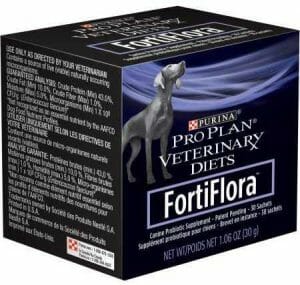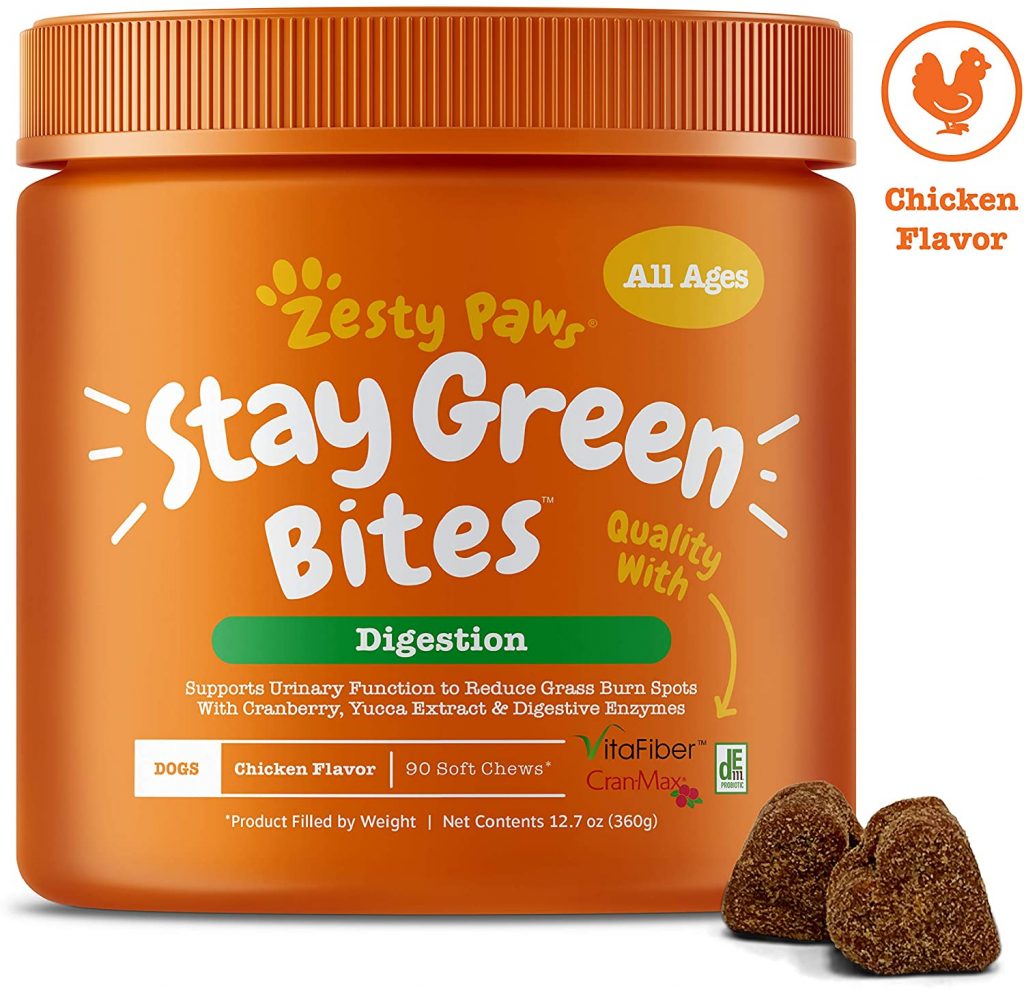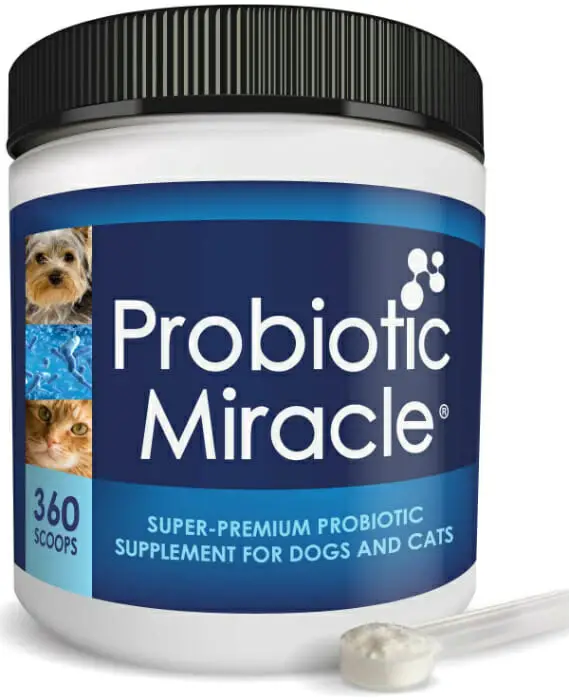Table of Contents
- Why and when are probiotics necessary for a puppy?
- Can I give human probiotics for my puppy?
- Are probiotic supplements safe for puppies?
- PREbiotics vs. PRObiotics
- Should I consult a vet first?
- Potential side effects of probiotics
- [Buying Guide] Probiotics for puppies with diarrhea
- TOP 3 PROBIOTICS FOR PUPPIES WITH DIARRHEA
- OUR #1 PICK!
- RUNNERS-UP
- Zesty Paws Stay Green Bites
- NUSENTIA Probiotic Miracle Dog Probiotics
- Frequently Asked Questions
- Final words
Is your puppy experiencing diarrhea? Poor digestion? The best probiotics for puppies with diarrhea can help in easing the discomfort and symptoms. This supplement provides good bacteria that will restore the balance of the gut flora. Aside from that, it also promotes coat health and a stronger immune system.
| PROBIOTICS | BRAND | EXPERT RATING | CHECK PRICE |
|---|---|---|---|
 | Purina Pro Plan Fortiflora Canine Probiotic Supplement | Check Price | |
 | Zesty Paws Stay Green Bites | Check Price | |
 | NUSENTIA Probiotic Miracle Dog Probiotics | Check Price |
If you’re looking for the best options, we reviewed three of the best picks in the market. We also discussed a buying guide and more valuable tips for pup owners.
Why and when are probiotics necessary for a puppy?
Probiotics are live cultures that include healthy yeast and bacteria. All of this helps improve your dog’s digestive health. Although these are bacteria, it’s the good type that benefits your pet. Aside from canines, probiotics are also suitable for humans.
Aside from this, probiotics also bring various perks like the following:
*Antioxidant properties
*Better resistance to diarrhea
*Endurance against stress
*Resistance to food poisoning
*Stronger immune system.
*Better coat health
There are more benefits to giving your dog probiotic supplements. Just make sure that you pick the right one that suits your pup’s needs.
Can I give human probiotics for my puppy?
Actually, human-grade probiotics have very little difference to probiotics given to dogs. However, some supplements have a higher dose and different ingredients. Always check it first to prevent any untoward side effects to your pet.
As much as possible, consult the vet if you’re planning to administer non-canine probiotics to your pooch. Like human babies, you have to be very careful about what you give your puppy.
At all times, purchase a probiotic supplement made for puppies. Besides, there’s a good reason why there’s a specific formulation for dogs.
Are probiotic supplements safe for puppies?
As long as you purchase one that’s made for puppies, your doggo should be fine. If you’re in doubt, nothing beats the expertise of a veterinarian.
Also, make sure that the supplement is FDA-approved and tested to be safe for canines. You can also try giving natural probiotic sources to your dogs like plain Greek yogurt, artichokes, honey, and leeks.
However, dog foods don’t usually meet the needs of your pooch when it comes to probiotics. This is why you can supplement with various probiotic products made for canines.
The Association of American Feed Control Officials (AAFCO) refers to probiotic products as ‘direct-fed microbials’.
If your pooch is taking antibiotics and other medications, consult with a vet first before giving it any probiotic product. As much as good bacteria are beneficial, it may have contraindications on your dog’s health.
PREbiotics vs. PRObiotics
Many pet owners get confused about the difference between prebiotics and probiotics. Prebiotics are a dietary fiber that serves as fertilizer for the good bacteria in the dog’s gut.
On the other hand, probiotics are live bacteria that will boost the health of the digestive tract. Probiotics can live on prebiotics, making these two substances indispensable for your dog’s gut health. Some of the examples of probiotics are lactobacillus and bifidobacterium.
So which one does your dog needs? Both, actually. For pups with diarrhea, both probiotics and prebiotics can help alleviate the symptoms. In fact, you can find probiotic products that are also packed with prebiotics for a double dose of benefits.
Should I consult a vet first?
Yes! You should always consult with a veterinarian before giving your pup any type of supplement. The same goes if you’re switching the puppy to a new diet to cure diarrhea.
Veterinarians can help determine the cause of diarrhea and what you can do to prevent it. This way, you can also avoid any harsh side effects.
Potential side effects of probiotics
Probiotics are relatively safe among dogs. Also, it’s quite uncommon for supplements like this to cause adverse side effects. Still, being cautious will go a long way, especially for pups with diarrhea and a sensitive stomach.
Usually, the root cause of the adverse side effects of probiotics is the other ingredients added. Since probiotic products for dogs are made into snacks and treats, you have to read the label always.
If your pup becomes gassy, constipated, or bloated after taking a probiotic product, the ingredients may be causing such problems.
[Buying Guide] Probiotics for puppies with diarrhea
If you’re looking for the best probiotics for puppies with diarrhea, make sure that you consider these points first:
-Go for a dry type
As much as possible, choose a dry or semi-moist product. You can get a powder that you can mix with your doggo’s food. It’s easier to administer, and it doesn’t stand the chance of spoilage. Aside from that, probiotics in powder-form have been stabilized and will be activated upon reaching your dog’s intestines.
Also, you can look for a semi-moist treat so you can replace the snack of your pooch. However, this doesn’t bear as much bacteria as powder products. Still, it’s an excellent choice for pups and dogs that don’t need very high doses of live bacteria.
Again, always check the ingredients and make sure that nothing will irritate your dog’s tummy.
-Check how much bacteria are in it
Each probiotic product comes with a specific amount of live bacteria. The more bacteria the product has, the better it is for your puppy or adult dog. Usually, probiotics are measured by CFUs or colony-forming units. Aim for the highest possible CFUs on the product you’ll purchase.
Also, check what type of live bacteria is present on the probiotic product. It could be lactobacillus strains, Bacillus coagulans, Enterococcus faecium, and more. Most of the time, these products will have two or more live bacteria.
-Look for combination prebiotics and probiotics
If possible, look for a product packed with a combination of prebiotics and probiotics. This way, the live bacteria will have a place to thrive. The dietary fiber will also help stiffen the stool of your dog to reduce the onset of diarrhea.
Anyway, you only need a small amount of prebiotics for a supplement. And although it comes in small doses, it’s very crucial in the overall wellness of your dog.
-Consider the manufacturer’s trustworthiness
Although the brand doesn’t necessarily embody the quality of the product, it will give you an idea of the probiotic product’s reputation. Also, many dog owners trust a specific brand due to its ingredients and production process. Some of the great options are Purina, NUSENTIA, and Zesty Paws.
-Look for minimal ingredients
If you’re opting for chewable treats, always look for one with minimal and natural ingredients. This way, your puppy is less likely to experience allergic reactions. It’s also a good decision, especially if your doggo has intense diarrhea.
TOP 3 PROBIOTICS FOR PUPPIES WITH DIARRHEA
If you’re in the hunt for the most trusted and highly effective probiotics for puppies with diarrhea, don’t miss these three picks!
OUR #1 PICK!
OUR TOP PICK: Purina Pro Plan Fortiflora Canine Probiotic Supplement

Product Name: Purina Pro Plan Fortiflora Canine Probiotic Supplement
Product Description: Our top pick for this roundup goes to the Purina Pro Plan Fortiflora Canine Probiotic Supplement. It’s a powder-form probiotic that comes in a single-serving sachet. Also, we really like the proprietary microencapsulation process of this product that ensures the efficiency and stability of the live cultures. Aside from that, the Fortiflora is the leading probiotic supplement recommended by many veterinarians. It suits puppies and adult dogs suffering from diarrhea and other intestinal issues.
Offer price: 10
Currency: USD
Availability: InStock
-
Probiotic Content
-
Stability
-
Value for Money
Overall
Summary
Each sachet of the Purina Pro Plan Fortiflora contains Enterococcus faecium blended with natural vitamins, minerals, and animal digest. This comes in a 30-gram/30 count box with a 1x 108 CFU/g of live bacteria concentration.
Overall, the powder is 43% protein, 10% fat, and 1% crude fiber. Take note that you should only feed one sachet to your dog each day. Also, we recommend that you consult with a vet before administering this to your pooch.
Pros
✔️1x 108 CFU/g
✔️Stabilized live cultures
✔️Proprietary microencapsulation
Cons
❌The product expires fast
RUNNERS-UP
Zesty Paws Stay Green Bites

Do you prefer a probiotic bite for your doggo? If so, try the Zesty Paws Probiotic for Dogs. It’s packed with prebiotics and probiotics for a powerhouse supplement-cum-treats. A tub of this treat contains 3 billion CFUs that will ease diarrhea, gassiness, bloating, constipation, and indigestion among dogs. It can also soothe hotspots, thanks to its papaya ingredient, rosemary extracts, and other natural ingredients.
This probiotic product contains Bacillus coagulans and Lactococcus subtilins. It’s a powerhouse of good bacteria guaranteed to improve your dog’s digestive health and immune system.
Aside from its nutritional value, this Zesty Paws Probiotic Bites have a chicken flavor. This is why your dog will find the 90 soft chews on this tub irresistible.
For dogs that weigh up to 25 pounds, give one chew a day. Meanwhile, dogs in the 26 to 75-pound range should be given two and for canines that are over 75 pounds heavy, three chews are ideal.
✔️Multiple probiotics in one
✔️Delicious chicken flavor
❌Not for picky doggos
.
NUSENTIA Probiotic Miracle Dog Probiotics

If you’re looking for other probiotics for puppies with diarrhea, you can consider the NUSENTIA Probiotic Miracle Dog Probiotics. This powder probiotic for canines has 360 billion CFUs per 360-scoop jar. It’s fortified with 12 times more fortiflora than other products.
Most of all, the NUSENTIA Probiotics contain a series of species-appropriate live cultures. It includes Lactobacillus acidophilus, Bifidobacterium animalis lactis, Lactobacillus rhamnosus, Lactobacillus plantarum, Lactobacillus salivarius, and Lactobacillus reuteri. It also contains stearic acid and inulin.
This supplement helps soothe diarrhea, loose stool, yeast overgrowth, digestive problems, allergies, and scratching. It’s also helpful in curing bad breath and other gut-related problems.
Moreover, this probiotic supplement doesn’t have maltodextrin, rice, gluten, GMO, dairy, soy, fillers, and other allergens. So if your pooch has the most sensitive stomach, this is the right choice for a probiotic supplement.
Also, we really like that it comes with a 100% money-back guarantee within 60 days after your purchase. Just make sure that you use the whole tub within 8 to 10 months for the best effects.
✔️GMO, gluten, filler-free
✔️60-day money-back guarantee
❌Expires fast, so you have to use it regularly
.
Frequently Asked Questions
Q: Can I give my dog yogurt as a probiotic?
A: Yes, as long as it’s plain and unflavored. Avoid any added sweeteners or flavorings that may piss your pup’s tummy even more. Also, make sure that your yogurt has a lot of live cultures. Plain Greek yogurt is one of the best options here.
Q: Is pumpkin a probiotic for dogs?
A: Pumpkin is a healthy food for pups and adult dogs. It’s rich in fiber, which is prebiotic. Unfortunately, it doesn’t contain probiotics. Nevertheless, pumpkin soup is an excellent meal for dogs experiencing diarrhea due to its high fiber content.
Q: Do dogs need probiotics every day?
A: Depending on the dosage of the probiotic you purchased, you can give it to your dog every day. Some are snacks that can be given a few times a day. If you’re in doubt, you can always consult with your dog’s vet.
Q: Do probiotics for dogs help with bad breath?
A: If your dog’s bad breath is due to digestive problems, probiotics can help a lot. However, you should also check with the vet since bad breath can also be due to kidney and dental problems.
Q: Can a dog have too much probiotic?
A: As long as you don’t over-feed the probiotic supplement, it’s rare for dogs to have too much probiotic. But for dogs with diarrhea, you should be careful to prevent upsetting your pooch’s tummy.
Final words
Probiotics for puppies with diarrhea help reduce digestive problems. Aside from that, it also boosts the immune system of your pooch to dodge other diseases. What’s important is you choose the right probiotic product that suits your pet’s needs. Most of all, consult with a veterinarian first. This will determine if your pup or adult dog is fit for a specific type of supplement.
What do you think of our picks here? Let us know below!
